Multiple senior Chinese officials warned on Tuesday against any proposed “wanton sanctions” on the Taliban, a jihadist terrorist organization, by the United States in the aftermath of the group’s takeover of Afghanistan.
The warning comes as the World Bank and International Monetary Fund (IMF), among other international institutions, freeze funding to Afghanistan in light of the Taliban’s return to power – expressing both human rights concerns and confusion regarding who is currently serving as head of state of the country. The Taliban leadership has not appointed a head of state or announced the installation of any individuals as actual leaders of the country at press time.
The Taliban became the de facto national government of Afghanistan after ex-President Ashraf Ghani fled Kabul, the capital, on August 15. Taliban jihadists had surrounded Kabul hours earlier but not yet entered the city. Following Ghani’s flight, Taliban leaders announced the country would rebrand as the “Islamic Emirate of Afghanistan” and the Taliban would build a full government apparatus to replace the fallen republic as soon as possible.
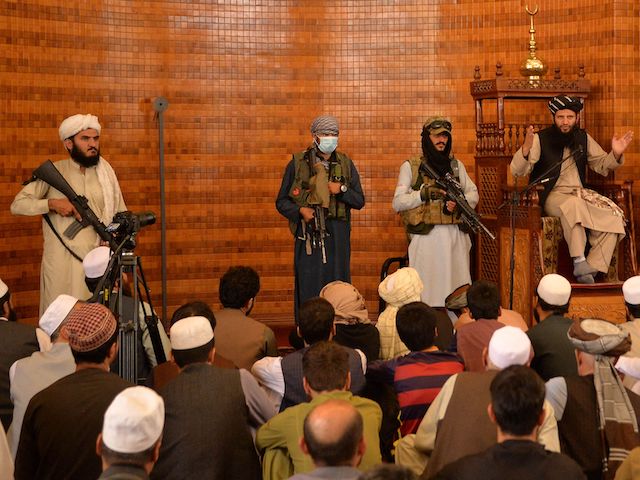
Armed Taliban fighters stand next to an Imam during Friday prayers at the Abdul Rahman Mosque in Kabul on August 20, 2021, following the Taliban’s stunning takeover of Afghanistan. (Hoshang Hashimi/AFP via Getty Images)
Taliban leaders have spent much of the past year courting support from China, which borders Afghanistan is and America’s top geopolitical rival. Taliban spokesmen have enthusiastically expressed interest in having the Communist Party import its Belt and Road Initiative (BRI) – a global infrastructure plan that forces poor countries into unpayable, high-interest debts – to Afghanistan as soon as possible. In exchange for overtures from the radical Islamist group’s leaders, China has refrained from condemning their violent conquest of the country and has bizarrely referred to the siege as the will of the Afghan people.
The Chinese state propaganda outlet Global Times cited the two most powerful voices in Chinese foreign policy, Foreign Minister Wang Yi and senior Politburo member Yang Jiechi, as warning America in particular against any move to sanction the Taliban over its decades-long history of extreme human rights abuses, particularly against women. The two leaders reportedly “condemned US’ wanton sanctions on Afghanistan, and called on the international community to help the nation to enhance its ability to achieve self-development.”

A Taliban fighter walks past a beauty salon with images of women defaced using spray paint in Shar-e-Naw in Kabul on August 18, 2021. (Photo by Wakil Kohsar/AFP via Getty Images)
Yang, reportedly speaking at a meeting of several leaders of the BRICS countries (Brazil, China, India, Russia, and South Africa), demanded the world “should respect the will and choice of the Afghan people and encourage Afghanistan to build a broad and inclusive political structure.” As with other Chinese officials making similar statements, no evidence suggests that Yang explained what he meant by “will and choice of the Afghan people,” given that no Afghans have voted for a Taliban government and no polls or other attempts at gauging popular sentiment suggest that the Taliban’s ouster of the legitimate government was the product of a decision by the majority of Afghan citizens.
Wang reportedly raised the issue of sanctions in a separate conversation, commanding, “the US should not simply walk away or impose sanctions on Afghanistan.”
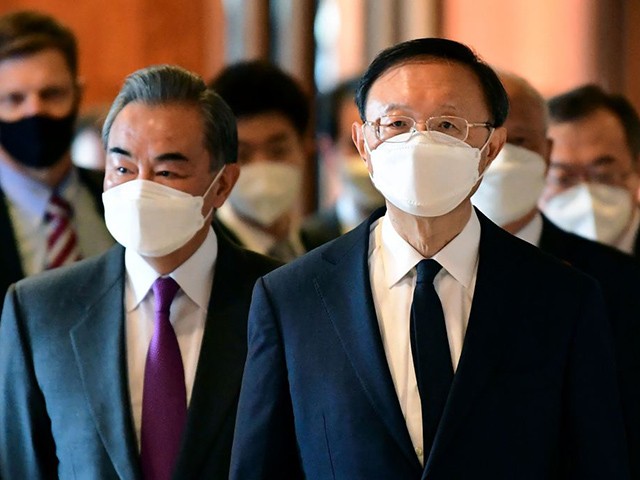
Yang Jiechi (R), director of the Central Foreign Affairs Commission Office for China, and Wang Yi (L), China’s Foreign Minister, arrive for a meeting with US counterparts at the Captain Cook Hotel in Anchorage, Alaska on March 18, 2021. (Frederic J. Brown/POOL/AFP via Getty Images)
China was among the first countries in the world to receive the news of the Taliban’s victory in Kabul as a positive development. Chinese Foreign Ministry spokeswoman Hua Chunying also described the military takeover as “the choice and will of the Afghan people,” on August 16, the first day she held her regular press briefing after the fall of the Afghan government. Hua offered the Taliban China’s “friendship and cooperation” and asserted, “China hopes that the Taliban will implement its previous vows to establish through negotiation an open and inclusive Islamic government and act responsibly to ensure the safety of Afghan citizens and foreign missions in Afghanistan.”
The Foreign Ministry maintained its amicable tone towards the jihadist terrorist organization on Wednesday.
“China and the Afghan Taliban have smooth and effective communication and consultation,” spokesman Wang Wenbin told reporters. “China respects the Afghan people’s independent choice of their own future … and stands ready to continue to develop good-neighborliness, friendship and cooperation with Afghanistan.”
While Beijing has not formally recognized the Taliban as the government of Afghanistan, it has not indicated in any way that it does not consider the Taliban leadership the ruling regime.
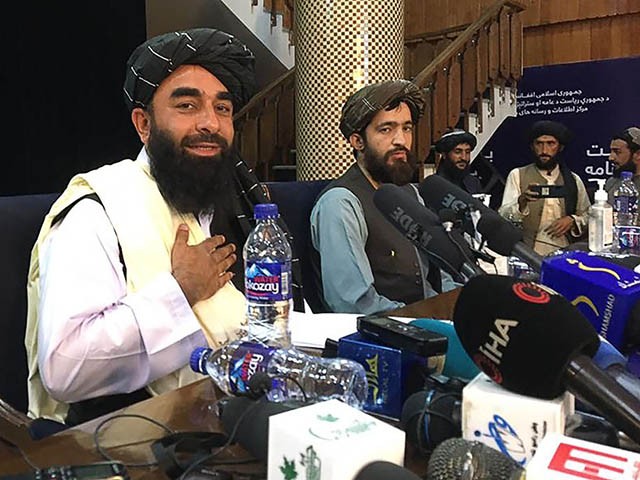
Taliban spokesperson Zabihullah Mujahid (L) gestures as he arrives to hold the first press conference in Kabul on August 17, 2021 following the Taliban stunning takeover of Afghanistan. (Photo by Hoshang Hashimi/AFP via Getty Images)
The day before, Wang urged the world to invest in the Taliban.
“The international community should encourage and work for the positive developments of the Afghan situation, support peace and reconstruction in Afghanistan,” Wang advised, “and help the nation to improve people’s livelihood and enhance its ability to achieve self-development. Wantonly slapping sanctions and exerting pressure solves no problem and will only be counterproductive.”
Many international monetary institutions and investors do not appear keen to follow Wang’s advice. Last week, the IMF announced that it would freeze $460 million it had reserved for emergencies for the government of Afghanistan, scheduled to be released next week.
“There is currently a lack of clarity within the international community regarding recognition of a government in Afghanistan, as a consequence of which the country cannot access [reserve funding] or other IMF resources,” an IMF spokesperson reportedly told Reuters.
The World Bank followed on Tuesday, explicitly referencing the Taliban’s widespread human rights abuses for its decision.
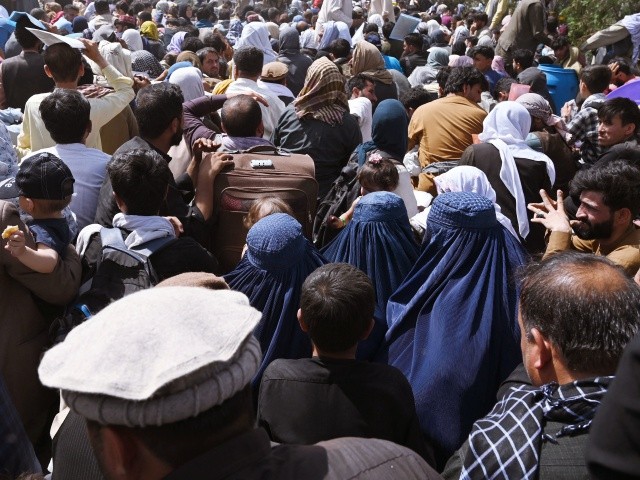
Afghans gather on a roadside near the military part of the airport in Kabul on August 20, 2021, hoping to flee from the country after the Taliban’s military takeover of Afghanistan. (Wakil Kohsar/AFP via Getty Images)
“We are deeply concerned about the situation in Afghanistan and the impact on the country’s development prospects, especially for women,” World Bank spokesperson Marcela Sanchez-Bender reportedly told CNN, according to Afghanistan’s Tolo News. “We have paused disbursements in our operations in Afghanistan and we are closely monitoring and assessing the situation in line with our internal policies and procedures.”
The Taliban has also failed to access the funds in Afghanistan’s central bank, reportedly under the control of the New York Federal Reserve.
Taliban spokesman Suhail Shaheen called the IMF’s decision last week “an injustice” and urged the world to invest in a successful Taliban regime.
“We need the reconstruction of Afghanistan, the people of Afghanistan need the budget. The [central bank] shall need the budget,” Shaheen told China’s state-run CGTN network.
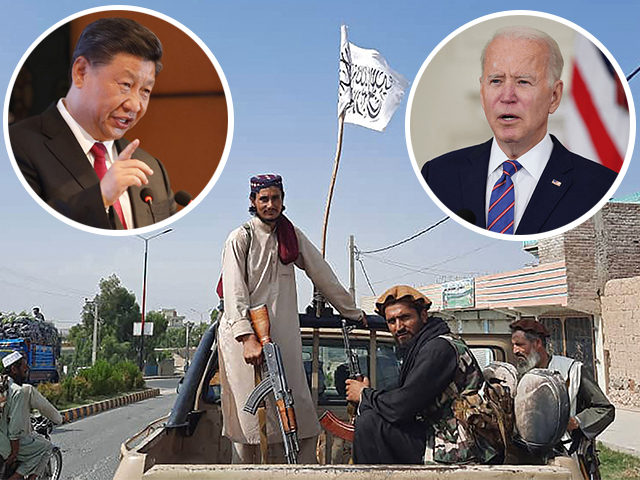
COMMENTS
Please let us know if you're having issues with commenting.